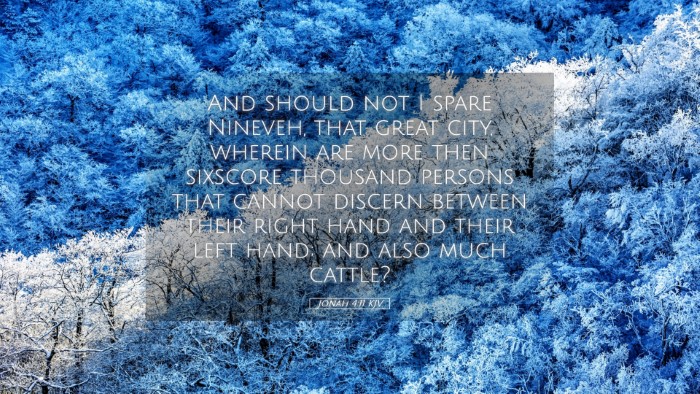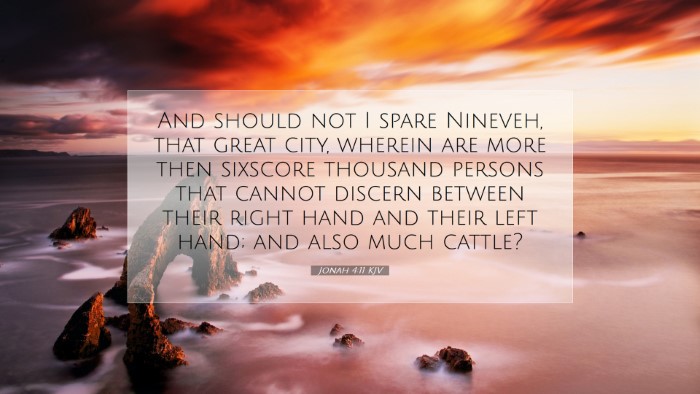Old Testament
Genesis Exodus Leviticus Numbers Deuteronomy Joshua Judges Ruth 1 Samuel 2 Samuel 1 Kings 2 Kings 1 Chronicles 2 Chronicles Ezra Nehemiah Esther Job Psalms Proverbs Ecclesiastes Song of Solomon Isaiah Jeremiah Lamentations Ezekiel Daniel Hosea Joel Amos Obadiah Jonah Micah Nahum Habakkuk Zephaniah Haggai Zechariah MalachiJonah 4:11
Jonah 4:11 KJV
And should not I spare Nineveh, that great city, wherein are more then sixscore thousand persons that cannot discern between their right hand and their left hand; and also much cattle?
Jonah 4:11 Bible Commentary
Commentary on Jonah 4:11
Verse: "And should not I spare Nineveh, that great city, wherein are more than six score thousand persons that cannot discern between their right hand and their left hand; and also much cattle?" (Jonah 4:11)
This verse encapsulates the central theme of God's compassion and mercy, juxtaposed against Jonah's reluctance to extend the same grace he received. Here, God challenges Jonah's narrow perspective concerning the city of Nineveh and its inhabitants.
Contextual Background
The Book of Jonah, unique among the Prophets, emphasizes God's grace not only towards Israel but also towards the Gentiles. This chapter brings the narrative to a conclusion, reflecting on God's love for a city steeped in sin and moral ignorance.
Insights from Commentaries
Matthew Henry's Commentary
Henry notes that God’s inquiry highlights the misguided nature of Jonah’s anger. Jonah grieved for the plant that provided him shade but neglected the vast population of Nineveh, who were spiritually blind. This contradiction leads to a profound lesson; God values human souls far more than the material comforts one might prioritize.
- Divine Compassion: God's willingness to spare Nineveh illustrates His abundant mercy; despite their evil, He seeks their repentance.
- Spiritual Ignorance: The phrase "cannot discern between their right hand and their left" suggests the moral ignorance of the Ninevites, underscoring their need for God's guidance.
- Jonah’s Perspective: Jonah's personal grievances cloud his understanding of God's broader mercy, representing a common struggle within the believer's journey of faith.
Albert Barnes' Notes
Barnes offers a deeper theological reflection on God's justice and mercy. He emphasizes that God’s love extends even to those remote from His covenant, challenging the exclusivity often associated with Israel. God's question to Jonah serves as a pivotal moment, showcasing the dichotomy between Jonah's limited view and God's expansive heart.
- Theology of God’s Sovereignty: Barnes highlights God's control over nations and cities, asserting that His desire is for all to come to repentance.
- The significance of the cattle: The inclusion of "much cattle" signifies God’s care for all creation; this may represent mercy extended even to the non-human elements of the city.
- Call to Pastors and Leaders: Barnes urges leaders to emulate God’s compassion, reminding them of their responsibility toward the lost and erring populations in society.
Adam Clarke's Commentary
Clarke emphasizes the rhetorical nature of God’s question, suggesting it is a decisive moment intended to provoke introspection in Jonah. He goes further to illustrate the societal and spiritual dynamics of Nineveh, translating its moral failings into a broader apocalyptic framework.
- Historical Context: Clarke explores the historical significance of Nineveh, noting that it was a powerful city representing human pride and rebellion against God.
- Nature of God’s Mercy: He asserts that God would rather see repentance than judgment, a theme echoed throughout scripture, revealing God’s ultimate desire for redemption.
- Call for Reflection: Clarke invites the reader to reflect on their own bitterness and reluctance to forgive or extend mercy to others, prompting a challenge to embody God's compassionate nature.
Theological Implications
This verse serves as a powerful reminder that God's thoughts and ways are infinitely higher than ours. It calls upon scholars and theologians to delve into the nature of Divine mercy, emphasizing the importance of understanding God's longing for the restoration of humanity over mere judgment.
- Universal Salvation: The emphasis on Nineveh as a “great city” with a large population serves to advocate for the concept of universal callings to salvation, transcending cultural and ethnic barriers.
- Spiritual Leadership: The implications for spiritual leaders are significant; it necessitates a reevaluation of priorities toward community and outreach efforts, echoing Jesus' commission to reach the world.
- Esoteric Knowledge vs. Practical Living: Engaging with the lost and facilitating their understanding of spiritual truths is a key responsibility of the Church, exemplifying the balance between doctrine and practical compassion.
Conclusion
Jonah 4:11 serves as a poignant reminder of God's unyielding love and mercy towards all beings, challenging the reader to cultivate a heart akin to God’s. It beckons pastors, students, and theologians to not only understand the scope of grace but to actively participate in God’s redemptive purpose for humanity. As God's representatives on Earth, they are called to extend grace where it is least expected, igniting hope in the hearts of those who wander in moral ignorance.
Ultimately, Jonah’s story becomes our narrative; a call to align our hearts with the Divine, to mourn for the lost, and to celebrate the grace that has been bestowed upon us, propelling us to share that same grace with others.


